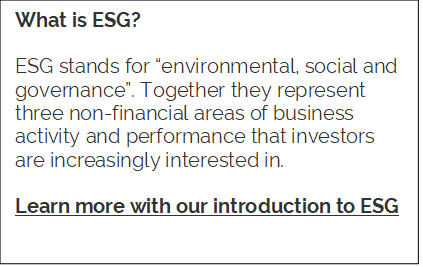What is ESG reporting?
Investors are increasingly asking companies to provide information in non-financial business areas. Get to grips with the basics of ESG reporting, and learn about what types of information investors are asking companies to measure and report on, and how Sedex can support this.

Investors’ interest in environmental, social and governance (ESG) performance has increased in recent years, as public expectations for companies to operate more ethically and be more transparent grow.
Investor requests for more information on business activity in these areas comes as many countries are beginning to implement legislation requiring this. This means that many companies will need to fulfil new reporting requirements.
While laws requiring reporting on responsible business activities do exist in some countries, not all companies are necessarily required to fulfil these, and they may not cover the interests of investors and what they would like these companies to report on.
This means that different investors and ratings agencies (firms that provide ratings based on businesses’ financial strength) have developed their own criteria for measuring ESG performance. This has resulted in fragmentation, with many different reporting requirements and standards that businesses could be asked to meet. At the same time, there is a great deal of cross-over between these requirements and standards – making ESG reporting a complicated landscape for companies to address.
Creating standardised ESG metrics
In 2020, the World Economic Forum and other companies[i] defined 21 core ESG metrics and 34 expanded metrics across four areas – governance, planet, people, and prosperity. These metrics are designed to standardise ESG reporting globally, and to support progress towards the UN Sustainable Development Goals.
The metrics are clear and specific, guiding businesses on what to measure and enabling investors to compare businesses more accurately. The metrics also provide a framework for new legislation, such as the upcoming EU law on human rights and environmental due diligence, that might require companies to report on ESG areas.
In 2021, 61 large companies including HP, Mastercard, Nestlé, Sony and Unilever committed to reporting against the 21 metrics[ii].
What do ESG reporting requirements ask businesses to measure?
Each investment firm and ratings agency measures ESG criteria and performance in different ways, which is why the standardised metrics are useful. These metrics also tell companies exactly what to measure and how to report the findings.
Click an ESG area below to view examples from the 21 standardised metrics. Some metrics require businesses to look only at their own organisation and operations, while others require looking at suppliers and supply chains as well.
How to prepare for ESG reporting
- Talk to your investors about what they would like you to measure and how. You could start with the 21 standard ESG metrics. Look at what your company already measures – it’s likely you already track performance and activities in several relevant areas, and can report against some of these metrics with minor adjustments.
- Adjust your processes for capturing information on your company’s operations and supply chains. For example, you might need to gather more information from suppliers, or split more data into male and female categories.
- Analyse your operations and supply chain using the information you gather. The Sedex platform enables you to store data from across your supply chain, integrating work site information, audit findings and risk assessment data to analyse everything together.
- Use this analysis to understand and report on your company’s current performance in ESG areas, identify priority areas for improvement, and track progress.
Contact Sedex to find out how we can help you measure and report on non-financial business areas.
[i] The World Economic Forum’s International Business Council, Ernst & Young, PricewaterhouseCoopers, KPMG and Deloitte worked together to define the 21 core and 34 expanded standardised ESG metrics. Full whitepaper here.



